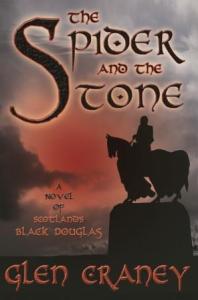 The Spider and the Stone:
The Spider and the Stone:
A Novel of Scotland’s Black Douglas
by Glen Craney
Genre: Historical Fiction
433 pages
As the 14th century dawns, Scotland’s survival hangs by a spider’s thread. While the clans scrap over their empty throne, the brutal Edward Longshanks of England invades the weakened northern kingdom, scheming to annex it to his powerful realm.
But one frail lad stands in the Plantagenet monarch’s path.
The beleaguered Scots cherish James Douglas as their “Good Sir James.” Yet in England, his slashing raids deep into Yorkshire wreak such terror that he is branded the Black Douglas with a reward placed on his head.
As a boy, James falls in love with the ravishing Isabelle MacDuff, whose clan has long inaugurated Scottish monarchs on the hallowed Stone of Destiny. But James’s world is upturned when he befriends Robert Bruce, a bitter enemy of the MacDuffs. Forced to choose between love and clan loyalty, he and Isabelle must make fateful decisions that will draw the opposing armies to the bloody field of Bannockburn.
The Spider and the Stone: A Novel of Scotland’s Black Douglas is available at Amazon.com, Smashwords, Amazon UK, and most online booksellers.
Exclusive excerpt from The Spider and the Stone by Glen Craney
A clamor rising up from the banks of the Thames rattled Westminster’s stained glass windows. The lords of the English Parliament, fearing another bread riot had broken out, adjourned their plenary session to take up the arms stored in the cloakroom.
Bishop Lamberton, swept up in the rush from his diplomatic station in the rear benches, elbowed his way to the doors. His heart sank at what he saw outside.
A mob was parading William Wallace half-naked on a nag down the Strand. Crowned with a laurel wreath to mock his injudicious boast at Stirling Bridge that he would one day wear the English crown, the once-indefatigable Scot warrior had aged terribly during his seven years on the run. He looked frightfully gaunt and his long hair had thinned to a pitiful, ragged mane.
The bishop fought a path through the jeering throngs. “Wallace!”
Heartened to hear a brogue, Wallace found the only friendly face in the rabble.
“Who betrayed you, Wil?”
Wallace hung his head at having let down their insurrection forces. “Mentheith.”
Lamberton paled with rage at John de Mentheith, the traitor from Dumbarton. Clenching his fists, he slipped behind the barricades and hurried alone through a back alley toward Westminster Hall. He fought his way to the guarded doors and demanded reentry by invoking the ecclesiastical authority of his crucifix. Inside the chaotic courtroom, he found Peter Mallorie, the king’s chief justiciar, perched high on the bench with six other jurists chosen from the usual slate of petty barons whose allegiance had been purchased by the Plantagenets.
Wallace, bloodied, was dragged in and manacled to the docks.
Mallorie could barely be heard above the tumult. “You, William Wallace of Renfrew, are charged with high treason!”
Lamberton pushed toward the bar. “The accused must be permitted an advocate!”
Mallorie ignored the point of order and hurriedly read out the indictment. “A runaway from righteousness! A robber! A committer of sacrilege! An arsonist and a murderer more cruel than Herod and more debauched than Nero!”
Half starved and weighed down by the chains, Wallace heaved with each difficult breath. “The victim robs the robber?”
Mallorie pointed a finger in threat. “The prisoner shall be silenced!”
Wallace fought his restraints. “My woman! Ravished and murdered!
Rehearsed calls for the death sentence drowned out Wallace’s hoarse defense, and Lamberton now saw that these judicial shills were determined to hold a sham trial without calling witnesses. While in the city these past months, he had told all who would listen that the High Sheriff of Lanark, William de Heselrig, had murdered Wallace’s wife, and more than a few here were sympathetic to Wallace’s grievance.
“I swore no homage to Edward Plantagenet!” Wallace cried.
Lamberton shook his head to warn his old friend that such claims, though justified, would only inflame sentiment for his execution. All now rested on asserting Wallace’s standing as a former governor of Scotland.
Mallorie leaned over the bench. “At Stirling, you did slay Hugh Cressingham and six hundred troops by stealth, seducing them into your snares like criminals in the night!”
Wallace roared, “Does your King commit a crime when he fights the French? If I am charged with waging war for my country’s freedom, then I stand guilty!”
“He confesses!” one of the barons shouted.
Wallace rattled his chains. “Aye, I have slain Englishmen! And I have stormed castles unjustly claimed! But Edward of England has committed the same acts upon us!”
Mallorie sped his notary to ink the quill. “The felon affirms his guilt!”
Lamberton shouted over the hooting. “Of rightful conflict only!” Ignored, he pleaded with Wallace, “Demand to be represented by a Guardian! That will gain delay!”
Wallace slumped in defeat. Delivered up as a scapegoat by his own countrymen, he had no more fight left in him. “Save yourself, Bishop. Tell the lads I did my best.”
Before Lamberton could protest Wallace’s resignation, the swarming scum manhandled the bishop to the rear of the courtroom.
Mallorie stood to be heard. “The prisoner shall be dragged to Smithfield and hanged until unconsciousness, cut down and revived, castrated, disemboweled, his entrails burnt before his eyes, quartered and decapitated. His head shall be displayed on Tower Bridge and his limbs exposed to public view. What remains of his corpse shall be mutilated and burnt.”
The mob hushed to hear Wallace’s reaction to the sentence.
